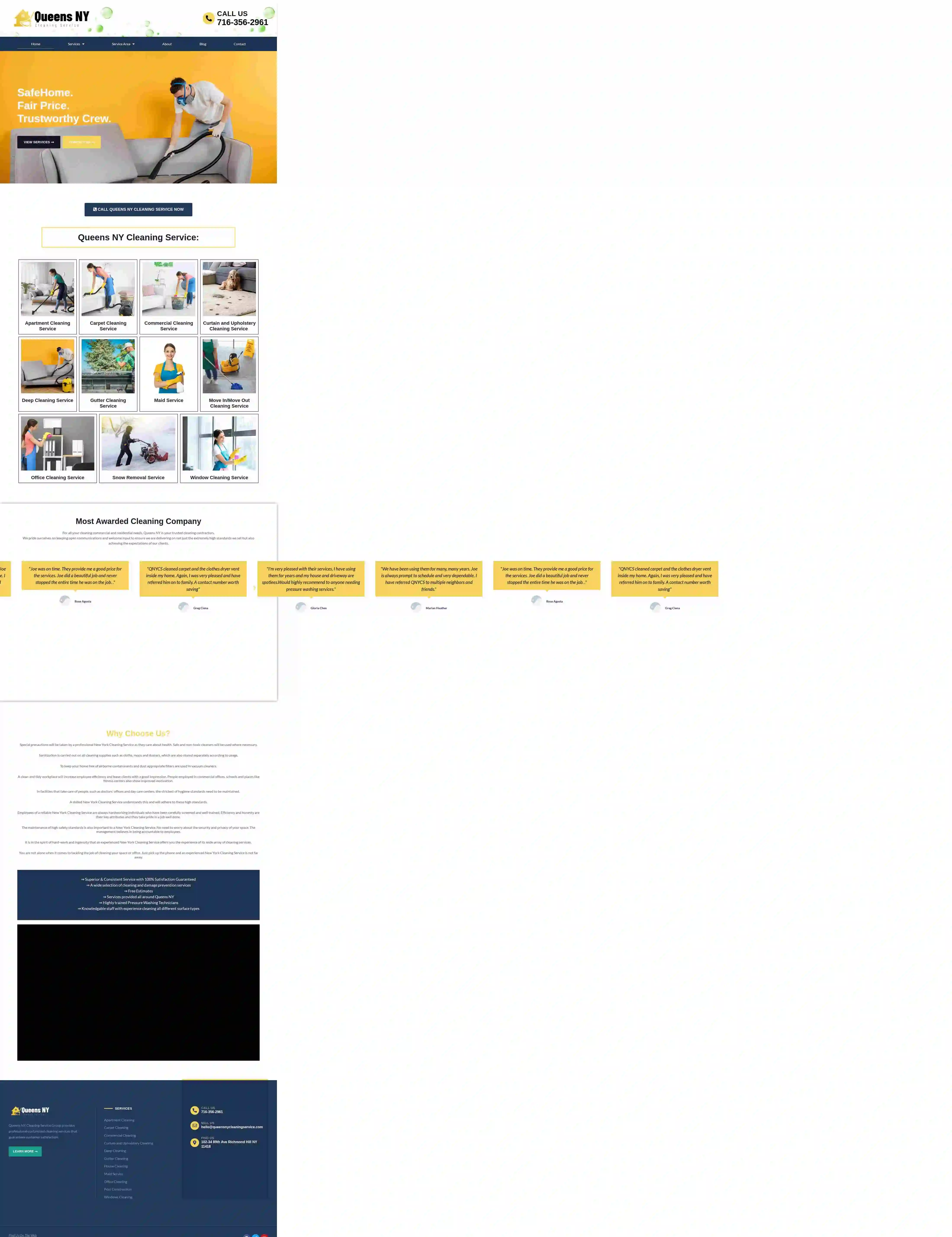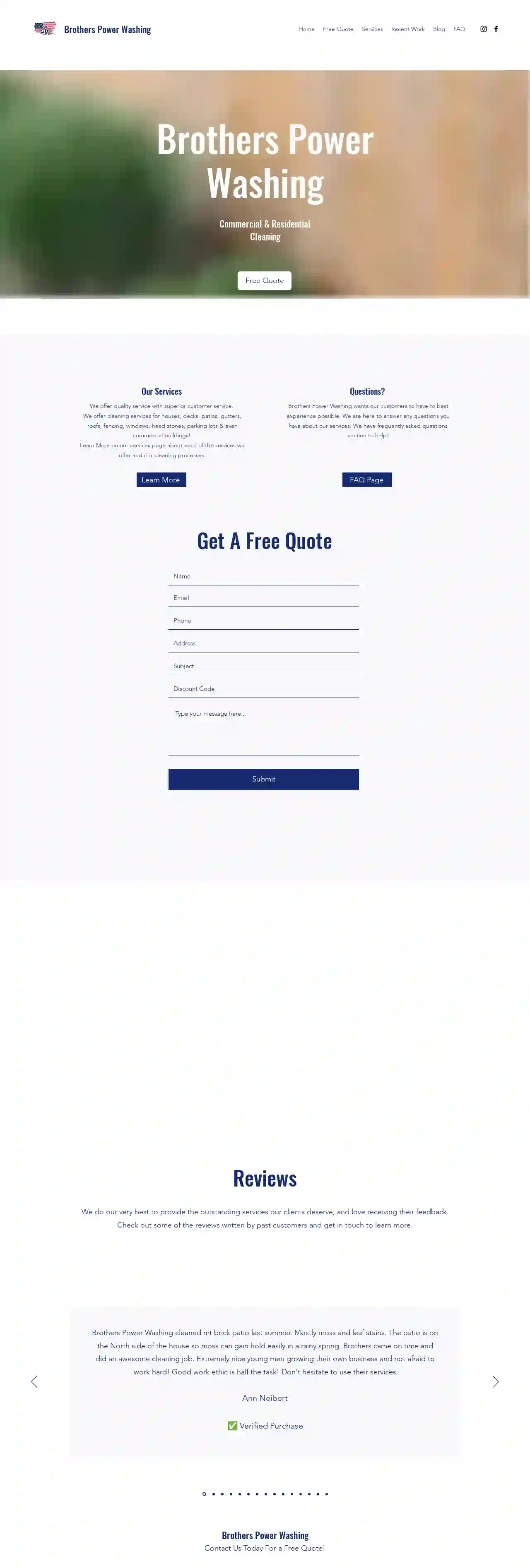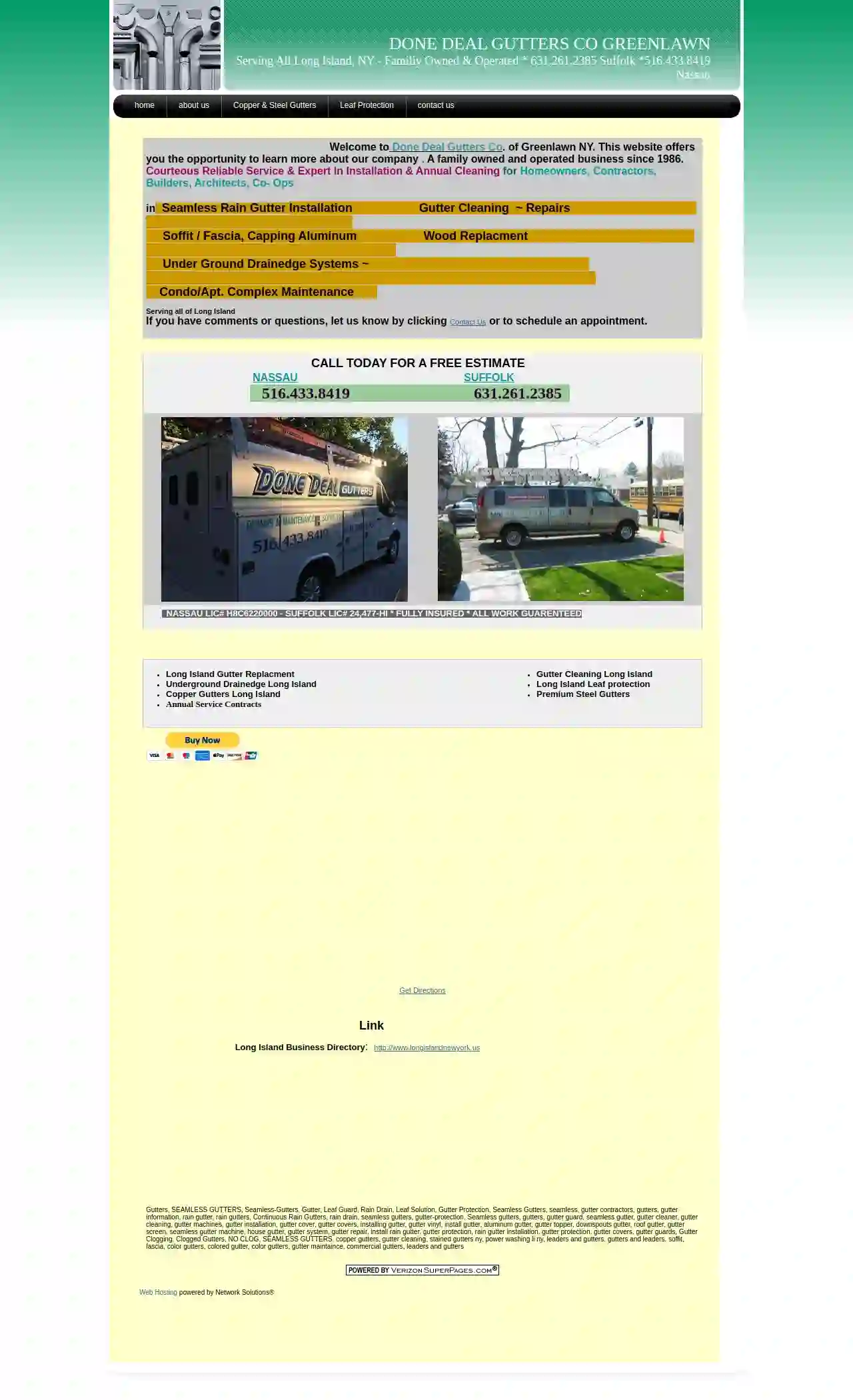Gutter Cleaning Mahopac
Find Gutter Cleaning in Mahopac
Receive 3 FREE Gutter Cleaning quotes for your project today! Compare profiles, reviews, accreditations, portfolio, etc... and choose the best service.

Home Clean Home
4.7184 reviewsBrooklyn, USHCH Inc. is a leading cleaning service for homes and businesses in New York. With almost 3 decades of experience, we understand the importance of trust and expertise in cleaning your home or office. Our team of professionals is dedicated to providing top-notch cleaning services, from residential cleaning to commercial cleaning, and everything in between. We are proud of our numerous awards and certifications, including being a SBA Certified Woman-Owned Business, an Inc. 5000 company, and a winner of the Interprizing Woman Award. Our services include residential cleaning, commercial cleaning, virus disinfecting, hoarders cleaning service, post construction/final cleaning, bed bug preparation, managed long term care, DME home modification, heavy duty cleaning, flood restoration, professional organization, upholstery cleaning, carpet cleaning, Passover cleaning, end of tenancy cleaning, and more. Contact us today to schedule your free consultation and get a quote.
- Services
- Why Us?
- Accreditations
- Our Team
- Gallery
Get Quote
George's Seamless Gutters
4.9133 reviewsWestchester County, USSince 1999, George's Seamless Gutters has been the go-to expert for all gutter and roofing needs in Westchester County. We pride ourselves on our seamless gutters, copper gutters, and sleek black gutters, along with our diverse range of gutter guards and downspouts. Our skilled team is dedicated to providing high-quality gutter installations that not only function flawlessly but also boost your home's curb appeal. We also offer expert roofing solutions including durable GAF roofing materials, chic standing seam metal roofs, versatile flat roofs, elegant copper roofing, meticulous roof flashing, and timely roof repairs. Our committed, in-house team ensures every project is executed with unmatched professionalism and meticulous attention to detail—no subcontractors involved.
- Services
- Why Us?
- Accreditations
- Our Team
- Gallery
Get Quote
Ned's Home of Long Island
4.6479 reviews123 Main St, New York, 10001, USNed Stevens Gutter Cleaning is a trusted and reliable gutter cleaning service provider. With over 50 years of experience, we offer a wide range of services including gutter cleaning, gutter installation, gutter replacement, gutter repair, seamless gutters, gutter guards, and gutter protection. Our team of experts is dedicated to providing top-notch services to our customers, ensuring their homes are safe and secure. We are proud to be a family-owned business with a commitment to excellence and customer satisfaction.
- Services
- Why Us?
- Accreditations
- Our Team
- Testimonials
- Gallery
Get Quote
CNY Exterior Cleaning and Construction
510 reviewsCicero, NY, Main Office, 13039, USCNY Exterior Cleaning & Construction is your one-stop shop for all your exterior cleaning and construction needs in the Central New York Region. We specialize in providing high-quality, reliable services for both residential and commercial properties. Our team of skilled professionals is dedicated to delivering exceptional results, from small renovations to large-scale projects. We pride ourselves on our attention to detail, expertise, and commitment to customer satisfaction. Whether you need your house washed, your roof cleaned, or a complete exterior remodel, we have the experience and resources to handle it all. We also buy houses in any condition, cash. Contact us today for a free consultation and let us transform your property into the dream space you've always envisioned.
- Services
- Why Us?
- Gallery
Get Quote
Fish Window Cleaning
510 reviews930 County St, 02726, USWelcome to Fish Window Cleaning of New Bedford, MA! We are your local window cleaning company for the New Bedford, Fall River, Mattapoisett, Seekonk, Marion, Dartmouth, Fairhaven, Westport, Acushnet, Somerset, and Swansea, MA! Call today for a free estimate! 508-999-5040 We proudly serve: New Bedford, Fall River, Mattapoisett, Seekonk, Marion, Dartmouth, Fairhaven, Westport, Acushnet, Somerset, and Swansea, MA Do you live in Rhode Island? We also serve Providence and the metro RI area. Click here to visit our RI site. Our specialty is in giving you perfectly clean windows, and we are ready to serve your business or home. Our window cleaners are trained to provide the superior customer service you expect when in the workplace or the quiet environment of your home. Window cleaning is our profession. It’s not just a job we do, and we treat it that way. "Fish Window Cleaning company is a reliable and professional business." - Maura G. "Your guys are great; very easy to deal with, efficient and hard working. You should give them a raise. Thank you. I look forward to working with you again." - Joseph S. Our services include: Commercial and Residential Window Cleaning Gutter Cleaning Power Washing Construction Cleanup Hard Water Stain Removal Screen Cleaning High-level Dusting Ceiling Fan Cleaning Your Home We provide cleaning of all types of windows, even the hard to reach ones of your home. You can rely on Fish Window Cleaning to take the utmost care of your residence as we clean your windows. We wear fresh shoe covers as we enter your home and use cloth pads under each window as we clean it to protect your carpet and wood floors. We work quietly and quickly as we move from room to room to cause the least disruption. We even introduce our team to you before we start cleaning so you know exactly who will be giving your windows a spectacular shine. Your Business We maintain storefronts and commercial buildings, helping you to achieve a polished look to give your customers a good impression. We provide cleanings ranging from weekly to annually, tailoring our services to the needs of your business. Regardless of your budget, we can put together a program for you. We’ve led the industry with a premiere safety program to ensure the protection of our customers and cleaners. We also provide the peace of mind that our licensed, bonded, and insured window cleaners will be maintaining the appearance of your business.
- Services
- Why Us?
- Our Team
- Testimonials
- Gallery
Get Quote
Queens NY Cleaning Service Group
51 reviews102-34 89th Ave, Richmond Hill, 11418, USQueens NY Cleaning Service is a trusted cleaning contractor for all your commercial and residential cleaning needs in Queens NY. We pride ourselves on open communication and welcome your input to ensure we meet your expectations. We are committed to providing high-quality cleaning services with a focus on safety and customer satisfaction. Our team of experienced and reliable professionals uses safe and non-toxic cleaners, adheres to strict hygiene standards, and takes pride in delivering exceptional results.
- Services
- Why Us?
- Testimonials
- Gallery
Get Quote
Clean Queens LLC
513 reviewsQueens, USSince opening in 2020, Clean Queens LLC has been a Professional Cleaning Company that is committed to providing professional cleaning and organizing services in the most efficient and effective manner to exceed our clients expectations each time. Providing top-quality and efficient services has been Clean Queens LLC main goal and mission while servicing our clients homes and businesses. Our team caters to your project's specific needs to ensure excellence. We hope you'll find what you're looking for. For more information or general inquiries, feel free to get in touch today.
- Services
- Why Us?
- Testimonials
- Gallery
Get Quote
Brothers Power Washing
534 reviewsSyracuse, USWelcome to Brothers Power Washing, your premier choice for commercial and residential cleaning services. We offer a wide range of services, including house cleaning, deck cleaning, patio cleaning, gutter cleaning, roof cleaning, fencing cleaning, window cleaning, headstone cleaning, and parking lot cleaning. Our team is dedicated to providing superior customer service and ensuring that every job is done to the highest standard. We are proud to serve our clients with a focus on quality and attention to detail. Contact us today for a free quote and let us help you get the job done!
- Services
- Why Us?
- Testimonials
- Gallery
Get Quote
Done Deal Gutters Co
45 reviews11740, Greenlawn, USWelcome to Done Deal Gutters Co. of Greenlawn NY. This website offers you the opportunity to learn more about our company. A family owned and operated business since 1986. Courteous Reliable Service & Expert In Installation & Annual Cleaning for Homeowners, Contractors, Builders, Architects, Co- Ops in Seamless Rain Gutter Installation Gutter Cleaning ~ Repairs Soffit / Fascia, Capping Aluminum Wood Replacment Under Ground Drainedge Systems ~ Condo/Apt. Complex Maintenance Serving all of Long Island If you have comments or questions, let us know by clicking Contact Us or to schedule an appointment. CALL TODAY FOR A FREE ESTIMATE NASSAU SUFFOLK 516.433.8419 631.261.2385 NASSAU LIC# H8C6220000 - SUFFOLK LIC# 24,477-HI * FULLY INSURED * ALL WORK GUARENTEED
- Services
- Why Us?
- Gallery
Get Quote
CNY Roof Cleaners - Veteran Owned
5704 reviews213 E Taft Rd, Syracuse, 13212, USCentral New York's Premiere Provider of Residential and Commercial Roof Cleaning and Exterior Maintenance. GET INSTANT ESTIMATE (315) 599-2153 (585) 302-2043 🎄Christmas Lights Installation 🎄
- Services
- Why Us?
- Gallery
Get Quote
Over 60,241+ Cleaning Services onboarded
Our cleaning service providers operate in Mahopac and beyond!
CleaningMatch has curated and vetted the Best Cleaning Services in Mahopac. Find a top & reliable contractor today.
Frequently Asked Questions About Gutter Cleaning
- Mesh Gutter Guards: Made of fine mesh that allows water to pass through while blocking debris. Relatively inexpensive and effective but may require occasional cleaning.
- Screen Gutter Guards: Similar to mesh guards but with larger openings, making them less prone to clogging but may not block smaller debris.
- Surface Tension Gutter Guards: Feature a curved design that allows water to adhere and flow into the gutter while debris slides off. Effective but can be more expensive.
- Foam Gutter Guards: Made of foam inserts that block debris but can become saturated with water and deteriorate over time.
- Brush Gutter Guards: Consist of bristles that allow water to pass through while blocking larger debris. May require more frequent cleaning than other types.
- Reduced Leaks: Seamless gutters have fewer seams, reducing the likelihood of leaks developing over time.
- Improved Appearance: Seamless gutters create a more aesthetically pleasing and streamlined look along your roofline.
- Less Maintenance: Fewer seams mean less opportunity for debris to accumulate, reducing the frequency of cleaning needed.
- House Size and Number of Stories: Larger houses and multi-story homes generally cost more to clean than smaller ones.
- Gutter Length: Gutter cleaning is often priced per linear foot. The longer your gutters, the higher the cost.
- Gutter Accessibility: Gutters that are difficult to access, such as those on steep roofs or with obstructions, may cost more to clean.
- Gutter Condition: Heavily clogged or damaged gutters may require more time and effort to clean, increasing costs.
- Additional Services: Services like gutter repair, gutter guard installation, or downspout cleaning will add to the overall cost.
- Visible Debris: You can see leaves, twigs, and other debris accumulated in your gutters from the ground.
- Sagging Gutters: Gutters that are filled with debris become heavy and can sag or pull away from the house.
- Water Overflowing: During rainfall, water spills over the sides of your gutters instead of flowing through the downspouts.
- Water Stains: Water stains on your siding or foundation indicate that your gutters are overflowing.
- Plant Growth: Plants or moss growing in your gutters indicate standing water and a lack of proper drainage.
How do I choose the right gutter guards?
The best gutter guards for your home depend on your budget, climate, and the type of debris you experience. Consult with a gutter professional to determine the most suitable option for your needs.
What are seamless gutters, and are they better than sectional gutters?
Advantages of Seamless Gutters:
While seamless gutters offer advantages, sectional gutters are typically more affordable and easier to repair if a section becomes damaged. The best choice for your home depends on your budget, aesthetic preferences, and the length and complexity of your roofline.
How much does gutter cleaning cost?
To get accurate pricing, request quotes from multiple gutter cleaning companies. Provide details about your house size, gutter length, and any additional services you require.
How do I know if my gutters need cleaning?
If you notice any of these signs, it's time to schedule a gutter cleaning.
How do I choose the right gutter guards?
- Mesh Gutter Guards: Made of fine mesh that allows water to pass through while blocking debris. Relatively inexpensive and effective but may require occasional cleaning.
- Screen Gutter Guards: Similar to mesh guards but with larger openings, making them less prone to clogging but may not block smaller debris.
- Surface Tension Gutter Guards: Feature a curved design that allows water to adhere and flow into the gutter while debris slides off. Effective but can be more expensive.
- Foam Gutter Guards: Made of foam inserts that block debris but can become saturated with water and deteriorate over time.
- Brush Gutter Guards: Consist of bristles that allow water to pass through while blocking larger debris. May require more frequent cleaning than other types.
The best gutter guards for your home depend on your budget, climate, and the type of debris you experience. Consult with a gutter professional to determine the most suitable option for your needs.
What are seamless gutters, and are they better than sectional gutters?
Advantages of Seamless Gutters:
- Reduced Leaks: Seamless gutters have fewer seams, reducing the likelihood of leaks developing over time.
- Improved Appearance: Seamless gutters create a more aesthetically pleasing and streamlined look along your roofline.
- Less Maintenance: Fewer seams mean less opportunity for debris to accumulate, reducing the frequency of cleaning needed.
While seamless gutters offer advantages, sectional gutters are typically more affordable and easier to repair if a section becomes damaged. The best choice for your home depends on your budget, aesthetic preferences, and the length and complexity of your roofline.
How much does gutter cleaning cost?
- House Size and Number of Stories: Larger houses and multi-story homes generally cost more to clean than smaller ones.
- Gutter Length: Gutter cleaning is often priced per linear foot. The longer your gutters, the higher the cost.
- Gutter Accessibility: Gutters that are difficult to access, such as those on steep roofs or with obstructions, may cost more to clean.
- Gutter Condition: Heavily clogged or damaged gutters may require more time and effort to clean, increasing costs.
- Additional Services: Services like gutter repair, gutter guard installation, or downspout cleaning will add to the overall cost.
To get accurate pricing, request quotes from multiple gutter cleaning companies. Provide details about your house size, gutter length, and any additional services you require.
How do I know if my gutters need cleaning?
- Visible Debris: You can see leaves, twigs, and other debris accumulated in your gutters from the ground.
- Sagging Gutters: Gutters that are filled with debris become heavy and can sag or pull away from the house.
- Water Overflowing: During rainfall, water spills over the sides of your gutters instead of flowing through the downspouts.
- Water Stains: Water stains on your siding or foundation indicate that your gutters are overflowing.
- Plant Growth: Plants or moss growing in your gutters indicate standing water and a lack of proper drainage.
If you notice any of these signs, it's time to schedule a gutter cleaning.
